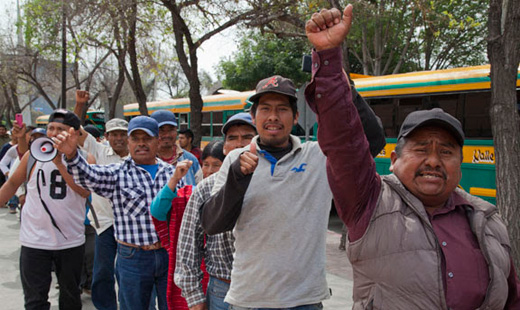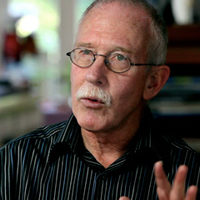
On March 29, 2015, U.S. photographer and labour activist David Bacon followed a group of farm workers in the San Quintín Valley in the Mexican state of Baja California as they marched to the U.S. border.
Thousands of workers – who pick strawberries and tomatoes for the U.S. market – went on a two-week strike in protest over their poverty wages. These farm workers, who mainly come from the southern Mexican state of Oaxaca and make up the bulk of the agricultural workforce in Baja, are paid about U.S. $9 a day; they were demanding wages of about 300 pesos, or U.S. $24.
Growers bring over whole families, particularly Mixtec and Triqui indigenous peoples, to live in labour camps and housing notorious for poor conditions. The whole operation is reminiscent of the maquiladora [export assembly plants] industry, transplanted into agriculture.
The big companies walked out of negotiations with the workers March, and signed contracts with government-affiliated unions that were not on strike. They promised 15 percent pay rises for the workers, which is much less than what they were asking for.
The biggest U.S. distributor, Driscoll’s, claimed its main grower, BerryMex, pays higher rates of U.S. $5 to US$9 per hour – a highly dubious claim, according to activists. The growers want to move towards a code of conduct that avoids any negotiation or contracts with the striking union, the Alianza. At the same time, growers brought more workers up from southern Mexico to break the strike.
In a final negotiation session between the workers’ organisation, the Alianza, and the government on 4 June 2015, authorities announced a new minimum wage in San Quintín of 150 (approximately U.S. $8.40), 165 (U.S. $9.20) or 180 pesos (U.S. $10) a day, depending on the size of the employer.
But at the top daily wage of 180 pesos, a Baja field worker has to work for almost three hours to buy a gallon of milk. Workers also say the companies are not abiding by the agreement, and have announced their support for a boycott of Driscoll’s berries.
Fidel Sanchez, leader of the strike told Bacon: “Consumers eat the fruits and the vegetables that these workers are producing, but know next to nothing about the workers themselves. This march, and the strike itself, show that workers are no longer willing to be invisible.”
Photo: After getting off the bus in Tijuana, striking farm workers line up to march to the border. | David Bacon












Comments